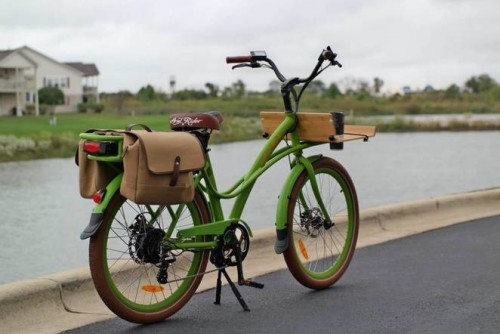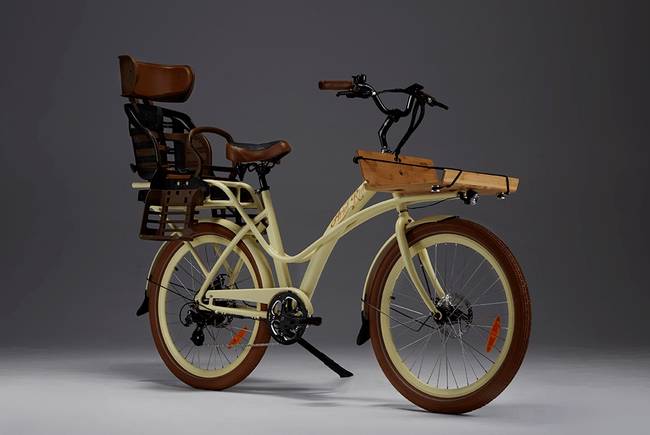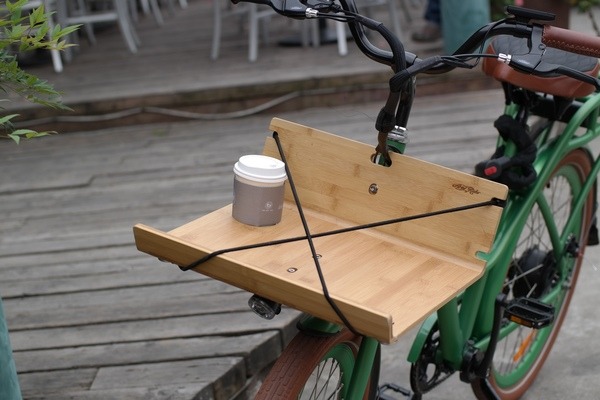RECOMMENDED VIDEOS

New Chevrolet Volt The king Of Hybrid Cars MPG
EcoCars4Sale

Electric Transit Bus
AMDAC (M) Sdn Bhd

DreamEdge - Electric Commuter
DreamEDGE Sdn Bhd

Better World Club | Auto Transportation Services in Portland
Better World Club

Aqualess Shine - Waterless Car Care Products
Aqualess Shine
Related Stories
Students compete to design energy-efficient, battery-powered rail vehicles
California makes huge investment in ‘widespread transportation electrification
EvoWheel converts almost any bicycle into an electric bike in just 30 seconds
The E-Fan X jet heralds an electric passenger plane revolution
Manta5’s new electric water bike lets you cycle on rivers and lakes
05 Jul, 2017

This electric city bike from Ariel Rider can haul 300 pounds of cargo on its rear rack and it has a place for your coffee cup right up front within reach
Green Transportation & Logistics | CANADA | 13 Jun, 2017
Published by : Eco Media Asia
It's not enough to simply add an electric drive train to a city bike and call it a day, as both new and regular cycle commuters need to also have a place for their stuff, whether it's just to carry a single daily-carry work bag or a way to transport a full load of groceries home. Although the rider can certainly add on panniers, a front and rear rack, pull a trailer, or just carry a big ol' backpack everyday, it's much more convenient and practical to have a bike that's made to haul stuff along with you as your daily rider, and we're starting to see more e-bikes that incorporate some way to do that.
The gold standard for carrying stuff on two wheels is the full-on cargo bike with an extended front end containing a dedicated payload area (also known as a bakfiets), but there are other styles out there as well, including the cargo trike. However, if you need to regularly carry more stuff than will fit into a backpack, but don't want to always be pedaling a full-sized cargo bike or pulling a trailer behind you, Ariel Rider's C-class of electric bikes might be just the right middle ground.
Ariel Rider, which also makes a few other models of vintage-styled electric bikes, now offers its C-class, which aims to integrate convenience, comfort, and cargo space into a fast, stylish, and practical commuter bicycle. Available with either a 250W or 500W electric motor, and in four colorful frame choices, the C-class is designed to "eliminate all the excuses not to use a bike for daily commuting."


The frames are 6061 aluminum alloy, with a step-through downtube for easy mounting, and rugged cargo racks on both front and rear. And these aren't your flimsy aftermarket racks, either, but are integral to the rest of the frame, and are rugged enough to carry 300 pounds on the rear alone. The front rack incorporates an open-sided bamboo tray for "pizza box or yoga mats," and has a built-in coffee cup holder, while the rear rack is bare and could accommodate boxes, crates, or even a kid carrier.
Power is provided by either a 36V 11 Ah Samsung battery (250W motor) or 48V 12 Ah battery (500W motor), with top speeds of 24 and 30 mph, respectively. The upright handlebars, fat city tires, and spring saddle all promise a comfortable ride, especially for those who are new to cycling, and front and rear LED lights enhance riding safety.
In addition, Ariel Rider touts what it calls its POD - Power On Demand - technology as being one of the ways it makes riding an e-bike "a joy," because it employs a torque sensor, not a cadence sensor, to control how and when the electric motor cuts in. Cadence sensors can be rather disconcerting to a new electric bike rider, especially if the cut-in happens fast, because as you start pedaling slowly, some e-bike motors will kick in at a set level and out of proportion to the rider's force, which can feel squirrelly and unsafe. A torque sensor, on the other hand, measures the force being applied to the cranks by the rider, and then adds to it, for a more natural cycling experience but with more powerful legs - what the company calls "the superman effect" of e-bikes. The bikes also have a throttle mode, which allows for riding without pedaling, although with a much shorter riding range per charge.
Here's a look at several of the Ariel Rider bikes, including the C-Class:
The C-Class bikes come with a Shimano Altus 7-speed derailleur on the rear, Avid BB7 disc brakes, soft handlebar grips, and a wide plush saddle, and cost $2,099 for the 250W version. The 500W version is only $100 more, and delivery of the bikes in the continental US takes about a week. Learn more at Ariel Rider.
Article from treehugger.com
by Derek Markham
